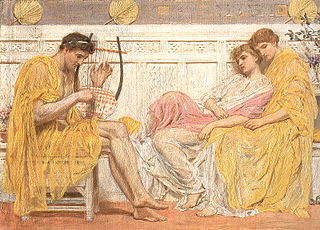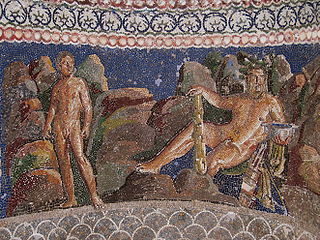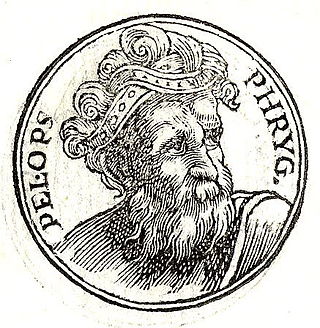Related Research Articles

An ode is a type of lyric poetry, with its origins in Ancient Greece. Odes are elaborately structured poems praising or glorifying an event or individual, describing nature intellectually as well as emotionally. A classic ode is structured in three major parts: the strophe, the antistrophe, and the epode. Different forms such as the homostrophic ode and the irregular ode also enter.

Bacchylides was a Greek lyric poet. Later Greeks included him in the canonical list of Nine Lyric Poets, which included his uncle Simonides. The elegance and polished style of his lyrics have been noted in Bacchylidean scholarship since at least Longinus. Some scholars have characterized these qualities as superficial charm. He has often been compared unfavourably with his contemporary, Pindar, as "a kind of Boccherini to Pindar's Haydn". However, the differences in their styles do not allow for easy comparison, and translator Robert Fagles has written that "to blame Bacchylides for not being Pindar is as childish a judgement as to condemn ... Marvell for missing the grandeur of Milton". His career coincided with the ascendency of dramatic styles of poetry, as embodied in the works of Aeschylus or Sophocles, and he is in fact considered one of the last poets of major significance within the more ancient tradition of purely lyric poetry. The most notable features of his lyrics are their clarity in expression and simplicity of thought, making them an ideal introduction to the study of Greek lyric poetry in general and to Pindar's verse in particular.
Asopus is the name of four different rivers in Greece and one in Turkey. In Greek mythology, it was also the name of the gods of those rivers. Zeus carried off Aegina, Asopus' daughter, and Sisyphus, who had witnessed the act, told Asopus that he could reveal the identity of the person who had abducted Aegina, but in return Asopus would have to provide a perennial fountain of water at Corinth, Sisyphus' city. Accordingly, Asopus produced a fountain at Corinth, and pursued Zeus, but had to retreat for fear of Zeus' terrible thunderbolt.
HieronI was the son of Deinomenes, the brother of Gelon and tyrant of Syracuse in Sicily, from 478 to 467 BC. In succeeding Gelon, he conspired against a third brother, Polyzelos.
In Greek mythology, Creusa may refer to the following figures:

In Greek mythology, Alcmaeon, as one of the Epigoni, was the leader of the Argives who attacked Thebes, taking the city in retaliation for the deaths of their fathers, the Seven against Thebes, who died while attempting the same thing.

Pindar was an Ancient Greek lyric poet from Thebes. Of the canonical nine lyric poets of ancient Greece, his work is the best preserved. Quintilian wrote, "Of the nine lyric poets, Pindar is by far the greatest, in virtue of his inspired magnificence, the beauty of his thoughts and figures, the rich exuberance of his language and matter, and his rolling flood of eloquence, characteristics which, as Horace rightly held, make him inimitable." His poems can also, however, seem difficult and even peculiar. The Athenian comic playwright Eupolis once remarked that they "are already reduced to silence by the disinclination of the multitude for elegant learning". Some scholars in the modern age also found his poetry perplexing, at least until the 1896 discovery of some poems by his rival Bacchylides; comparisons of their work showed that many of Pindar's idiosyncrasies are typical of archaic genres rather than of only the poet himself. His poetry, while admired by critics, still challenges the casual reader and his work is largely unread among the general public.

The Pythian Games were one of the four Panhellenic Games of Ancient Greece. They were held in honour of Apollo at his sanctuary in Delphi every four years, two years after the Olympic Games, and between each Nemean and Isthmian Games. The Pythian Games were founded sometime in the 6th century BC. In legend they were started by Apollo after he killed Python and set up the Oracle at Delphi. They continued until the 4th century AD.

In Greek mythology, Iolaus was a Theban divine hero. He was famed for being Heracles' charioteer and squire, and for helping with some of his Labors, as well as for being one of the Argonauts.
In Greek mythology, Iamus was the son of Apollo and Evadne, a daughter of Poseidon, raised by Aepytus.
In Greek mythology, the name Locrus or Lokros may refer to:

In Greek mythology, Pelops was king of Pisa in the Peloponnesus region. He was the son of Tantalus and the father of Atreus.

Tyche was the presiding tutelary deity who governed the fortune and prosperity of a city, its destiny. In Classical Greek mythology, she is usually the daughter of the Titans Tethys and Oceanus, or sometimes Zeus, and at this time served to bring positive messages to people, relating to external events outside their control.

In Greek mythology, Pirene or Peirene, a nymph, was either the daughter of the river god Asopus, Laconian king Oebalus, or the river god Achelous, depending on different sources. By Poseidon she became the mother of Lecheas and Cenchrias.
Isthmian Games or Isthmia were one of the Panhellenic Games of Ancient Greece, and were named after the Isthmus of Corinth, where they were held. As with the Nemean Games, the Isthmian Games were held both the year before and the year after the Olympic Games, while the Pythian Games were held in the third year of the Olympiad cycle.

Aegina was a figure of Greek mythology, the nymph of the island that bears her name, Aegina, lying in the Saronic Gulf between Attica and the Peloponnesos. The archaic Temple of Aphaea, the "Invisible Goddess", on the island was later subsumed by the cult of Athena. Aphaia (Ἀφαῖα) may be read as an attribute of Aegina that provides an epithet, or as a doublet of the goddess.

Diagoras of Rhodes was an Ancient Greek boxer from the 5th century BC, who was celebrated for his own victories, as well as the victories of his sons and grandsons. He was a member of the Eratidea family at Ialysos in Rhodes.
Aletes was a son of Hippotes, of Dorian ancestry, and a fifth-generation descendant of Heracles. He is said to have defeated in battle the Corinthians, taken possession of Corinth, and to have expelled the Sisyphids thirty years after the first invasion of the Peloponnesus by the Heraclids. His family, sometimes called the Aletidae, maintained themselves at Corinth down to the time of Bacchis. Velleius Paterculus calls him a descendant of Heracles, but of the sixth generation. He received an oracle, promising him the sovereignty of Athens if during the war, which was then going on, its king should remain uninjured. This oracle became known at Athens, and the Athenian king Codrus sacrificed himself to preserve the city.

The Greek lyric poet Pindar composed odes to celebrate victories at all four Panhellenic Games. Of his fourteen Olympian Odes, glorifying victors at the Ancient Olympic Games, the First was positioned at the beginning of the collection by Aristophanes of Byzantium since it included praise for the games as well as of Pelops, who first competed at Elis. It was the most quoted in antiquity and was hailed as the "best of all the odes" by Lucian. Pindar composed the epinikion in honour of his then patron Hieron I, tyrant of Syracuse, whose horse Pherenikos and its jockey were victorious in the single horse race in 476 BC.
Olympian 13, 'For Xenophon of Corinth', is an ode by the 5th century BC Greek poet Pindar.
References
- The Extant Odes of Pindar translated by Ernest Myers, Page 69, ISBN 978-1-4353-8274-9 (2008)
- Bockh and Dissen on Pindar, I. c.; Diod. xi. 70; Paus. iv. 24. § 5, ed. Bekker; Athen. xiii. p. 573
![]() This article incorporates text from a publication now in the public domain : Smith, William, ed. (1870). Dictionary of Greek and Roman Biography and Mythology .
This article incorporates text from a publication now in the public domain : Smith, William, ed. (1870). Dictionary of Greek and Roman Biography and Mythology .{{cite encyclopedia}}: Missing or empty |title= (help)
